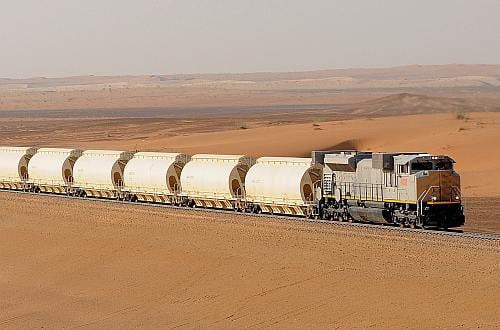SAR began operating phosphate trains in May 2011 between mines at Hazm Al-Jalameed and Ma’aden’s processing and export sites at Ras Al-Khair on the Arabian Gulf, a distance of around 1400km. SAR started transporting molten sulphur from the Eastern Province city of Waset to Wa’ad Al-Shamal in the north last May after connecting the latter to its network. A month later, it started transporting commercial phosphoric acid from Wa’ad Al-Shamal to Ma’aden’s refinery in Ras Al Khair.
According to SAR’s, Dr Bashar Bin Khaled Al Malik, the railway carried 23.68 million tonnes of phosphate, bauxite, molten sulphur and commercial phosphoric acid between May 2011 and June 2017.
SAR’s molten sulphur wagons are equipped with the latest safety equipment such as thermal insulation and safety valves to prevent combustion during transport as well as heating systems in each vehicle.
SAR freight trains carry about 16,000 tonnes per trip in trains consisting of three locomotives and more than 160 wagons. SAR says each trip is equivalent to taking 640 trucks off the roads.
SAR’s first passenger service, which started operation between Riyadh and Qassim on February 26, is expected to carry an average of 1100 passengers a day by the end of this year. The service will eventually run to Qurayyat near the Jordanian border. Traffic is expected to increase to an average of 6575 passengers a day.

